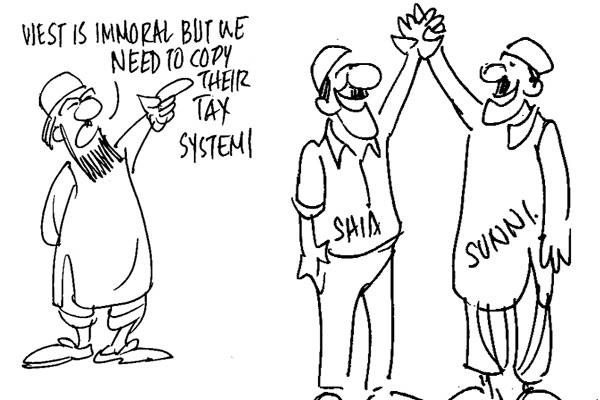
Stick to the task

Sir,
I have high respect and regard for Khawaja Asif, the federal minister for water and power, for his political struggle and contribution to democracy. However, I was extremely surprised to watch him on live TV, telling Pakistan’s energy-starved populace that he has not been on talking terms with Interior Minister Chaudhry Nisar for the last four years. I would like to point out that surely the people of Pakistan would like to hear from Khawaja Asif what he has done so far during the last two-and-a-half years, as federal minister for water and power, to the solve energy shortage in the country, rather than happily telling the public that he is not on talking terms with his fellow minister. The people of Pakistan expect Khawaja Asif to spend the maximum of his time and energy to help reduce load shedding by catching power thieves, reducing line losses and expediting the completion of power projects, which have been in the pipelines for years now, instead of making TV appearance and displaying immaturity by telling viewers that he is not on talking terms with Nisar. I think this is for the first time in the history of Pakistan that two sitting federal ministers are not talking to each other. This situation is not good for the country, and I am sure this must be damaging for the PML- N too. I can’t understand what was the need for Khawaja Asif to share this information with the people of Pakistan instead of bringing this matter to the attention of his leadership.
Ejaz Ahmad Magoon,
Lahore.
Afghans must see difference
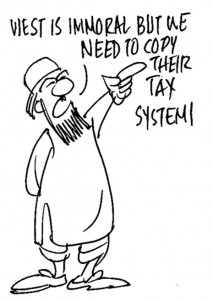
Sir,
The news of an Afghan man being shot dead as a group of 50 people, all from Afghanistan, tried to cross into Bulgaria from Turkey on October 15 reminded me of Afghan President Ashraf Ghani’s recent statement that “Pakistan is not a brotherly country”. The Afghan war in the 70s uprooted over 6 million Afghans. Neighboring Iran refused to accept their large-scale influx. Those accepted were kept in a confined and cordoned area. They were eventually sent back soon after the Russian withdrawal. Pakistan was the only country that embraced over 5 million Afghan refugees. The irony is that over 3 million Afghans still live in Pakistan. Even Ashraf Ghani, Hamid Karzai, Abdullah Abdullah and many in the Kabul government had been living in Pakistan. They are now in Afghanistan, but living a life depending on everything being imported or smuggled from Pakistan. Here in Karachi, they have virtually hijacked the city. Our troubles started when the Afghan refugees came. No one in the world is ready to accept the Afghans, anywhere. And Ashraf Ghani continues to say Pakistan is not a brotherly country of Afghanistan.
Samina Mallah,
Karachi
Govt and Army on same page
Sir,
The impression being created presently is that the Nawaz-led government in Islamabad and the military leadership in Rawalpindi are not on a same page. There is no denying that there is a difference of opinion when it comes to perceptions, way of working and modus operandi in fighting terrorism and dealing with matters of foreign policy. Many believe that this impression is wrong, saying, “This is the best politics that Nawaz has displayed in memory.” Many others, perhaps rightly so, give credit to General Raheel for playing his role smartly.
Analysts, particularly those interpreting the establishment’s moods, mince no words against Nawaz and his team, and give more credit for the current spirit of cooperation to General Raheel, claiming that he is dictating the terms of governance and is actually ruling from behind. They call it a coup of sorts where the government is functioning at the behest of the army chief, who is directly dictating foreign policy, and whose ISPR is holding the reins of the media. Senior journalists complain that the government is not asserting its will at all, and the ISPR is dictating terms to journalists and anchorpersons.
There is no meeting at the highest levels of government, where the chief and other military leadership would be present. Likewise, PM Nawaz and COAS Raheel visit and attend simultaneous events of national importance. The CPEC is apparently the government’s initiative and the outcome of Nawaz’s vision, but Gen Raheel is seen as owning it and is vowing to protect it at all costs. While dealing with MQM, PPP, Balochistan, Punjabi Taliban, LeJ, TTP, ISIS and even holding by-elections, the government and military seem to be on the same page. Even the propaganda against the Nawaz government and banners or posters in favour of the army chief come as a result of a well-designed and coordinated conspiracy.
Both the government and military leaderships must not yield to such designs and should continue working with harmony and close coordination in the national interest. There must not be any kind of ambiguity in that relationship, so that rumourmongers do not get an opportunity to spew their hatred. It is being said that the government, the PPP and the MQM have joined hands afresh against the military leadership. Political contacts are a norm and those who know Nawaz for the last many years understand that his agenda coincides with the army’s stance as far as his foreign policy goals are concerned, particularly against India. He is the one for whom Ziaul Haq prayed for longer life, given his contribution towards patriotism during the Khalistan movement days. One has the understanding that this is the only consensus government-establishment duo, which decided everything, probably at the time of Gen Raheel’s installing as army chief.
Marya Mufty,
Lahore
Root cause
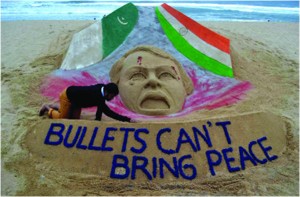
Sir,
India and Pakistan share a history of hostile relations since their independence in 1947. The countries have never been on good terms and apparently don’t seem like they will get along moving forward. Pakistan’s Chief of Army Staff General Raheel Shareef recently termed the cause of hostility between the two countries as the “incomplete division of subcontinent”. Obviously, the Kashmir dispute is the legacy of an incomplete division. If Britain had divided the subcontinent justly, the world would not fear a nuclear war in South Asia. According to the partition plan, the fate of over 550 princely states was left to the geographical location and wishes of the people. The State of Jammu and Kashmir should have acceded to Pakistan because of its geographical location and Muslim majority population. The instrument of accession signed by Maharaja Hari Singh of Kashmir with India did not reflect the true will of the people. It is cited in history that tribal Pakistanis raided Kashmir, and in response Maharaja Hari Singh asked for help from the Indian government, but this is an engineered and fake version of the past. In fact, Indian forces landed in Kashmir first and retaliation from indigenous Kashmiris came later, which was rightly supported by Pakistan.
Recent developments in India and Pakistan are once again threatening regional peace and stability, and the possibilities of a nuclear war in the region are being discussed in the international media. With Modi as India’s Prime Minister, the threats are greater for Pakistan. Modi’s ambitions are inviting Pakistan to a war, but economically Pakistan is not in a position to afford another war. Indian violations of the Line and Control, hate speeches against Pakistan, media campaigns and strong diplomacy, are all parts of their preplanned strategy. Pakistan’s nuclear power is its best bulwark; otherwise Modi Sarkar is in full mood to start a bloody adventure. Modi is hailed in India as the leader of pure Hindutva. He had and still has the support of hard-core Hindu extremist parties like RSS (Rashtriya Swayamsevak Sangh), which helped him grab the prime minister’s seat. Allegedly involved in the massacre of two thousand Muslims in Gujrat, Modi’s antagonism to Islam and Pakistan is not a new phenomenon, but his presence in the PM office is encouraging Indian hard-line parties and other members of parliament to engage in a war of words with Pakistan.
The issue of Kashmir will remain an ignition point for a nuclear war in the region. India needs to understand this better than Pakistan. As long as the Kashmiris are not given the right of plebiscite, Pakistan will extend its moral support to them. Pakistan needs powerful diplomacy to counter Indian lobbying, but sadly the Ministry of Foreign Affairs does not have a minister. Apparently, the army chief himself is doing the role of foreign affairs minister on behalf of the government.
Altaf Ahmad,
Lahore
Harmony is key
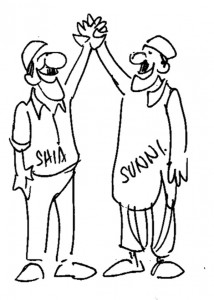
Sir,
We regularly hear how the Shia-Sunni split finds its roots in the early years of Islam, and how this rift continues to play out in what is happening in the Middle East. Too often our TV screen are full of all that created rift, but seldom do we ever see or hear what can bring us together as one people. When you get to the depth of the matter, the things that perhaps divide Shias and Sunnis are very few compared to all that unites us. Our faith, our beliefs, the crux of our practices, even our theological sources are more or the less similar. Why is it then that we refuse to bury the past and start fresh.
Perhaps there are academics and intellectuals that can shed light on the matter and prescribe a way forward. But the fact remains, we Muslims need to come together. The sooner the better. Millions have lost their lives over the centuries, just because they did not belong to someone else’s sect. Surely we can understand the folly of our differences and prevent millions more losing their lives as this drama continues to unfold. Our leaders, religious and otherwise, need to come together and preach love instead of hatred, unity instead of division, tolerance instead of extremism. Not only would this help resolve so many conflicts playing out in the world right now, but also benefit us in Pakistan as a nation.
Asad Amir,
Lahore.
Russia and China in Syria
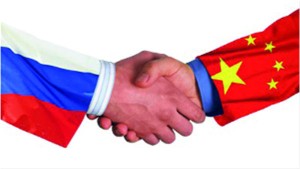
Sir,
Many believe that what is happening in the Middle East could give way to a third world war. Putin’s decision, immediately after his meeting with US President Obama on the sidelines of the UNGA session, to launch airstrikes at ISIS targets in Syria shocked not only Washington, but the entire world. However, nothing was as surprising, or perhaps as dangerous, as China’s decision to join Russia in that effort. If that were not enough, there is news coming from some quarters that Pakistan is likely to join the Russia-China coalition, which may have serious implications for Islamabad’s relations with various Muslim states.
China, on September 26, deployed its fighter aircraft carrier Shenyang J-15 in the area, alongside Russian carriers, where Putin’s forces are conducting overlapping air campaigns with a high risk of military clash with US forces. China recently carried out joint naval drills with Russia in the Eastern Mediterranean as well. A number of Chinese military advisers also joined Russian personnel in Latakia, a Syrian province that is considered Assad’s stronghold. Chinese Foreign Minister Wang Yi told the UN SC meeting, “The world can no longer afford to stand by with its eyes closed on what is going on in Syria.”
The question arises that why is China jumping into this war now? Was it prudent on Putin’s part to get involved in this affair to begin with? It seems other states have decided to take the same route as the US by fomenting and then triggering wars inside other countries. Defence analysts are of the opinion that the Russian and Chinese leaderships could’ve ‘woken up’ much earlier. They could have saved Saddam’s Iraq and Qaddafi’s Libya from the ruins they are now in. Such a coalition should have formed much earlier to exert pressure on the US and take measures to stop Washington from going too far in imposing preemptive wars.
Both Russia and China have stakes in Syria’s oil industry; China’s state-owned National Petroleum Corporation holds shares in two of Syria’s largest oil companies, while another Chinese company, Sinochem, holds a 50 percent share in Syrian oil fields. Reports say that there are indications regarding the emergence of the world’s new superpower axis between China, Russia and Pakistan. According to a report, the world is again turning bipolar with China, Russia, Pakistan and a number of other countries of Central Asia and Middle East on one side, and the US, EU, Japan and their Asian allies on the other side.
Eschmall Sardar,
Peshawar.
The Friday Times, Plot No 52-53, N-Block, Main Guru Mangat Road, Gulberg II, Lahore, Pakistan. 042.35779186; Fax: 042.35779186, email: tft@thefridaytimes.com *Letters must carry addresses and phone numbers *We ask you to restrict your comments to 300 words. Cartoons by Sabir Nazar

